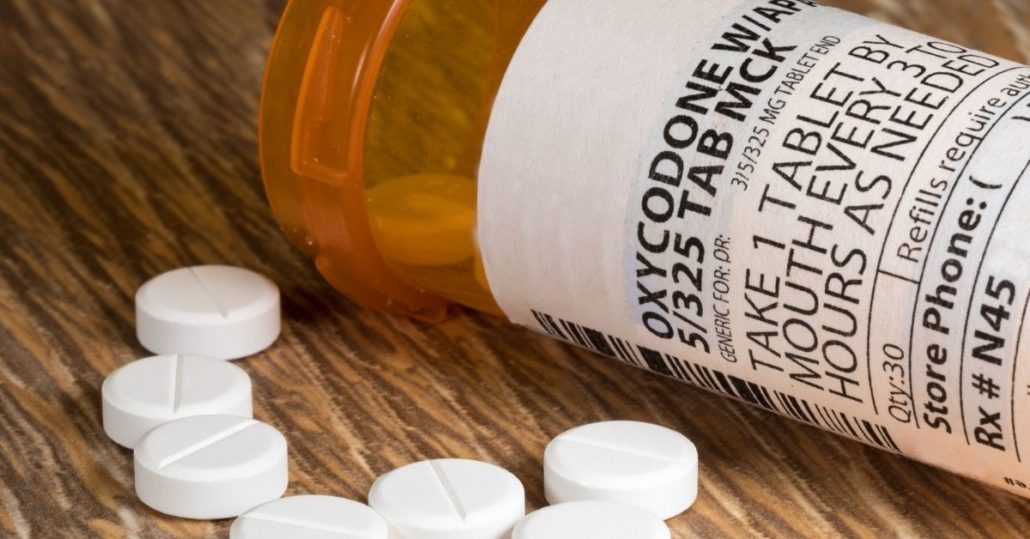What is Oxycodone?
Oxycodone is an opioid agonist prescription medication. A doctor will prescribe these drugs if there are no alternative treatment options that will work to treat moderate to severe pain [1]. It is part of a group of drugs known as opioids. Opioids include any drug that acts on opioid receptors in the brain and any natural or synthetic drugs derived from, or related to, the opium poppy. It is synthesized from thebaine, a constituent of the poppy plant [2].
Oxycodone is marketed alone as OxyContin in 10, 20, 40, and 80 mg extended-release tablets and other immediate-release capsules like 5 mg OxyIR. It is often used in combination with other drugs (Acetaminophen) such as Percocet and Roxicet. Common street names include Hillbilly Heroin, Kicker, OC, Ox, Roxy, Perc, and Oxy.
Oxycodone is abused orally or intravenously. The tablets are crushed and sniffed or dissolved in water and injected. Others heat a tablet that has been placed on a piece of foil then inhale the vapors. Oxycodone products are in Schedule II of the Controlled Substances Act, meaning they had medical use and a high potential for addiction. Euphoria and feelings of relaxation are the most common effects of oxycodone on the brain, which explains its high potential for abuse.
Oxycodone is most commonly used for things such as post-surgery recovery, broken bones, consistent pain, and cancer-related pain due to its powerful ability to relieve pain. It is usually prescribed by physicians in tablet form to be taken orally. To prevent OxyContin tablets from being injected by individuals who misuse them, they were reformulated in 2014. The tablets are now resistant to crushing and become a thick gel when added to water. They also have controlled release properties, even as a gel.


Get Your Life Back
Find Hope & Recovery. Get Safe Comfortable Detox, Addiction Rehab & Mental Health Dual Diagnosis High-Quality Care at the We Level Up Treatment Centers Network.
Hotline (877) 378-4154Oxycodone Dosage
Oxycodone comes as a solution (liquid), a concentrated solution, a tablet, a capsule, an extended-release (long-acting) tablet (Oxycontin), and an extended-release capsule (Xtampza ER) to take by mouth. The solution, concentrated solution, tablet, and capsule are taken usually with or without food every 4 to 6 hours, either as needed for pain or as regularly scheduled medications. The extended-release tablets (Oxycontin) are taken every 12 hours with or without food. The extended-release capsules (Xtampza ER) are taken every 12 hours with food; eat the same amount of food with each dose. Follow the directions on your prescription label carefully, and ask your doctor or pharmacist to explain any part you do not understand. Take oxycodone exactly as directed.
Long Term Effects of Oxycodone
Opioid pain relievers such as oxycodone are generally safe when taken for a short time and as prescribed by a doctor, but because they produce euphoria in addition to pain relief, they can be misused (taken in a different way or in a larger quantity than prescribed, or taken without a doctor’s prescription). Regular use—even as prescribed by a doctor—can lead to dependence and, when misused, opioid pain relievers can lead to addiction, overdose incidents, and deaths.
Prescription opioids such as Oxycodone works by binding and activating opioid receptors on cells located in many areas of the brain, spinal cord, and other organs in the body, especially those involved in feelings of pain and pleasure. When opioids attach to these receptors, they block pain signals sent from the brain to the body and release large amounts of dopamine throughout the body. This release can strongly reinforce the act of taking the drug, making the user want to repeat the experience.
Get Help. Get Better. Get Your Life Back.
Searching for Accredited Drug & Alcohol Rehab Centers Near You? Or Mental Health Support?
Even if you have failed previously, relapsed, or are in a difficult crisis, we stand ready to support you. Our trusted behavioral health specialists will not give up on you. Call us when you feel ready or want someone to speak to about therapy alternatives to change your life. Even if we cannot assist you, we will lead you wherever you can get support. There is no obligation. Call our hotline today.
FREE Addiction Hotline – Call 24/7
Oxycodone misuse can lead to overdose. When people overdose on opioid medication, they experience slowed breathing, which can cause hypoxia, a condition that results when too little oxygen reaches the brain. Hypoxia can have short- and long-term psychological and neurological effects, including coma, permanent brain damage, or death.
Repeat abuse of oxycodone impairs memory, cognition, emotions, and behaviors that can result in many negative and life-altering circumstances. The psychological burdens of depression, guilt, anxiety, and even schizophrenia, can make every day a struggle, and suicide may become appealing. Mood swings, aggression, and violent outbursts can become long-term effects of oxycodone abuse as a result of neurological damages or frequent disruptions and stress in relationships, finances, or other environmental issues.
It’s important to know that there are alternatives to oxycodone use for those who become dependent upon it. Because the drug requires a prescription, obtaining it can be tricky. Therefore, it’s not uncommon for users to turn to other forms of opioid drugs. Some alternatives that are easier to obtain include synthetic street drugs. One of the most popular is heroin. Many heroin users got their start after becoming dependent upon prescription pain pills.
What are the Side Effects of Oxycodone?
Oxycodone affects everyone differently, but its side effects may include:
- Pain relief
- Dizziness or faintness
- Tiredness
- Confusion and difficulty concentrating
- Euphoria or negative mood
- Restlessness
- Stiff muscles
- Constipation
- Dry mouth
- Stomach-ache and nausea
- Difficulty urinating
- Slow pulse
- Excess sweating, flushing and itching
- Mild allergic rash or hives (see your doctor promptly)
First-class Facilities & Amenities
World-class High-Quality Addiction & Mental Health Rehabilitation Treatment
Rehab Centers TourRenowned Addiction Centers. Serene Private Facilities. Inpatient rehab programs vary.
Addiction Helpline (877) 378-4154Proven recovery success experience, backed by a Team w/ History of:
15+
Years of Unified Experience
100s
5-Star Reviews Across Our Centers
10K
Recovery Success Stories Across Our Network
- Low Patient to Therapist Ratio
- Onsite Medical Detox Center
- Comprehensive Dual-Diagnosis Treatment
- Complimentary Family & Alumni Programs
- Coaching, Recovery & Personal Development Events
Oxycodone and Alcohol
The effects of combining oxycodone and alcohol can be very dangerous, as both substances depress the central nervous system (brain and spinal cord) so that they slow down or even stop breathing and heart function when they are ingested simultaneously in large enough quantities. Irreversible major organ and brain damage resulting in physical and cognitive disabilities can result from mixing oxycodone and alcohol. This combination can also be deadly in large enough quantities of both substances being ingested.
Doctors will never prescribe oxycodone to patients who are known to abuse alcohol. In addition, it is not advisable to drink alcohol while taking oxycodone. Chronic (long-term) use of oxycodone and alcohol can have serious long-term health consequences and may lead to:
- Liver and/or kidney damage
- Memory loss
- Heart failure
- Increased risk of cancer
Oxycodone Withdrawal Symptoms
Giving up oxycodone after a long time of use can be challenging because the body has to get used to functioning without it. It’s important to seek advice from a health professional whether you have been taking it with a prescription or not.
The duration of withdrawal symptoms can vary widely. They typically begin in this window of time and peak within 72 hours. These symptoms can last days, weeks, or even months. Withdrawal symptoms vary from person-to-person and are different depending on the type of oxycodone taken. Symptoms usually last around one week and can include:
- Goosebumps
- Insomnia
- Watery eyes
- Chills
- Sweats
- Tremors
- Shallow breathing
- Nausea and vomiting
- Stomach cramps
- Diarrhea
- Headache
- Appetite loss
- Sensitivity to pain
- Dilated pupils
- Racing heart rate
- High blood pressure
- Muscle, joint, and back pain
The psychological withdrawal symptoms include:
- Cravings
- Anxiety
- Agitation
- Memory issues
- Problems concentrating and thinking clearlyss
- Trouble feeling pleasure
- Depression
- Irritability
- Restlessness
Attempting to go cold turkey by quitting oxycodone on your own can leave you at risk for relapse or, worse, overdose and death.
World-class, Accredited, 5-Star Reviewed, Effective Addiction & Mental Health Programs. Complete Behavioral Health Inpatient Rehab, Detox plus Co-occuring Disorders Therapy.
CALL (877) 378-4154End the Addiction Pain. End the Emotional Rollercoaster. Get Your Life Back. Start Drug, Alcohol & Dual Diagnosis Mental Health Treatment Now. Get Free No-obligation Guidance by Substance Abuse Specialists Who Understand Addiction & Mental Health Recovery & Know How to Help.
Oxycodone Addiction Treatment
Because of the effectiveness and the legality of prescription drugs, it’s often challenging to convey the dangers connected with them to the public. The National Institute on Drug Abuse stresses that education is crucial in preventing abuse of and addiction to substances like oxycodone. Prevention is preferential to treatment, as it helps a person avoid the struggles of drug abuse and the possibility of addiction in the first place.
Medications
Medications can be helpful in this detoxification stage. This is to ease craving and other physical symptoms that can often prompt a person to relapse.
Medication-assisted treatment (MAT) can be considered by all individuals seeking treatment for Oxycodone addiction. Drugs such as Suboxone, Zubsolv, and Vivitrol may aid a person struggling with Oxycodone addiction in their recovery.
- Lofexidine. FDA approved, a non-opioid medicine designed to reduce opioid withdrawal symptoms. It is the primary medication for detoxification and Oxycodone withdrawal symptoms.
- Methadone (Dolophine or Methadose) is a slow-acting opioid agonist. Methadone is taken orally so that it reaches the brain slowly while preventing withdrawal symptoms. Methadone is only available through approved treatment programs, where it is dispensed to patients on a daily basis.
- Buprenorphine (Subutex). FDA approved. Buprenorphine relieves drug cravings without producing the “high” or dangerous side effects of other opioids. Suboxone is a novel formulation of buprenorphine that is taken orally and contains naloxone (an opioid antagonist) to prevent attempts to get high by injecting the medication.
- Naltrexone (Vivitrol). FDA approved. It is a medication primarily used to manage alcohol or opioid addiction by reducing cravings and feelings of euphoria associated with substance abuse. Opioid-addicted individuals should not receive naltrexone before detoxification.
- Naloxone should be given to any person who shows signs of an opioid overdose or when an overdose is suspected. It can be given as a nasal spray or it can be injected into the muscle, under the skin, or into the veins.
Behavioral Therapies
Behavioral therapies or Psychotherapies – therapies like cognitive behavioral therapy (CBT) help modify the patient’s expectations and behaviors related to drug use and increase skills in coping with various life stressors.
Detoxification
Many opioid-dependent individuals require detox as their first stop due to withdrawal symptoms they experience when they cease using opioids. Detox consists of a gradual tapering off of the patient’s usual dosage of opioids, while also shifting dependence from opioid to a drug with similar, but less severe and addictive effects.
The patient can then be weaned off the new drug, often avoiding the harmful results of prolonged Oxycodone withdrawal. After detox is complete, the patient enters inpatient rehab for an extended period of time based on how severe the addiction was.
If you or your loved one is suffering from Oxycodone side effects and addiction, indeed help is just a phone call away. Professional opioid addiction treatment is necessary for fast and effective recovery. Contact us today at We Level Up NJ Treatment Facility. We provide utmost care with doctors and medical staff available 24/7 for life-changing and lasting recovery. We provide an enhanced opportunity to return to a fulfilling and productive life.

Experience Transformative Recovery at the We Level Up Treatment Center.
See our authentic success stories. Get inspired. Get the help you deserve.



Start a New Life
Begin with a free call to an addiction & behavioral health treatment advisor. Learn more about our dual-diagnosis programs. The We Level Up treatment center network delivers various recovery programs at each treatment facility. Call to learn more.
- Personalized Care
- Caring Accountable Staff
- World-class Amenities
- Licensed & Accredited
- Renowned w/ 5-Star Reviews